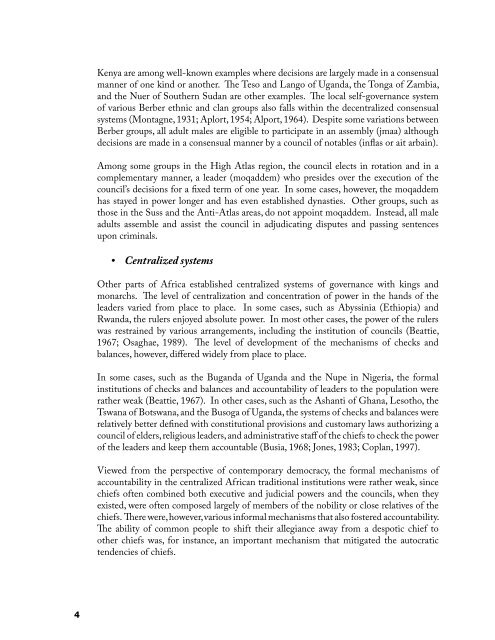Relevance of - United Nations Economic Commission for Africa
Relevance of - United Nations Economic Commission for Africa
Relevance of - United Nations Economic Commission for Africa
You also want an ePaper? Increase the reach of your titles
YUMPU automatically turns print PDFs into web optimized ePapers that Google loves.
Kenya are among well-known examples where decisions are largely made in a consensual<br />
manner <strong>of</strong> one kind or another. The Teso and Lango <strong>of</strong> Uganda, the Tonga <strong>of</strong> Zambia,<br />
and the Nuer <strong>of</strong> Southern Sudan are other examples. The local self-governance system<br />
<strong>of</strong> various Berber ethnic and clan groups also falls within the decentralized consensual<br />
systems (Montagne, 1931; Aplort, 1954; Alport, 1964). Despite some variations between<br />
Berber groups, all adult males are eligible to participate in an assembly (jmaa) although<br />
decisions are made in a consensual manner by a council <strong>of</strong> notables (inflas or ait arbain).<br />
Among some groups in the High Atlas region, the council elects in rotation and in a<br />
complementary manner, a leader (moqaddem) who presides over the execution <strong>of</strong> the<br />
council’s decisions <strong>for</strong> a fixed term <strong>of</strong> one year. In some cases, however, the moqaddem<br />
has stayed in power longer and has even established dynasties. Other groups, such as<br />
those in the Suss and the Anti-Atlas areas, do not appoint moqaddem. Instead, all male<br />
adults assemble and assist the council in adjudicating disputes and passing sentences<br />
upon criminals.<br />
• Centralized systems<br />
Other parts <strong>of</strong> <strong>Africa</strong> established centralized systems <strong>of</strong> governance with kings and<br />
monarchs. The level <strong>of</strong> centralization and concentration <strong>of</strong> power in the hands <strong>of</strong> the<br />
leaders varied from place to place. In some cases, such as Abyssinia (Ethiopia) and<br />
Rwanda, the rulers enjoyed absolute power. In most other cases, the power <strong>of</strong> the rulers<br />
was restrained by various arrangements, including the institution <strong>of</strong> councils (Beattie,<br />
1967; Osaghae, 1989). The level <strong>of</strong> development <strong>of</strong> the mechanisms <strong>of</strong> checks and<br />
balances, however, differed widely from place to place.<br />
In some cases, such as the Buganda <strong>of</strong> Uganda and the Nupe in Nigeria, the <strong>for</strong>mal<br />
institutions <strong>of</strong> checks and balances and accountability <strong>of</strong> leaders to the population were<br />
rather weak (Beattie, 1967). In other cases, such as the Ashanti <strong>of</strong> Ghana, Lesotho, the<br />
Tswana <strong>of</strong> Botswana, and the Busoga <strong>of</strong> Uganda, the systems <strong>of</strong> checks and balances were<br />
relatively better defined with constitutional provisions and customary laws authorizing a<br />
council <strong>of</strong> elders, religious leaders, and administrative staff <strong>of</strong> the chiefs to check the power<br />
<strong>of</strong> the leaders and keep them accountable (Busia, 1968; Jones, 1983; Coplan, 1997).<br />
Viewed from the perspective <strong>of</strong> contemporary democracy, the <strong>for</strong>mal mechanisms <strong>of</strong><br />
accountability in the centralized <strong>Africa</strong>n traditional institutions were rather weak, since<br />
chiefs <strong>of</strong>ten combined both executive and judicial powers and the councils, when they<br />
existed, were <strong>of</strong>ten composed largely <strong>of</strong> members <strong>of</strong> the nobility or close relatives <strong>of</strong> the<br />
chiefs. There were, however, various in<strong>for</strong>mal mechanisms that also fostered accountability.<br />
The ability <strong>of</strong> common people to shift their allegiance away from a despotic chief to<br />
other chiefs was, <strong>for</strong> instance, an important mechanism that mitigated the autocratic<br />
tendencies <strong>of</strong> chiefs.
















